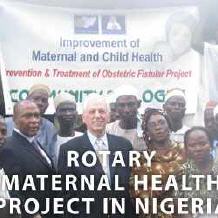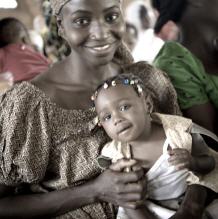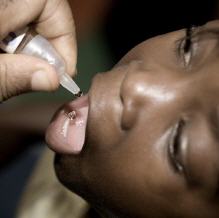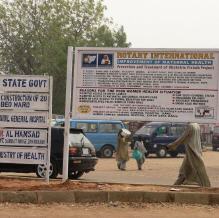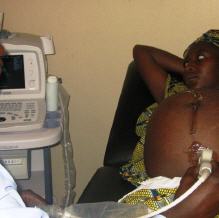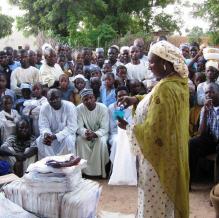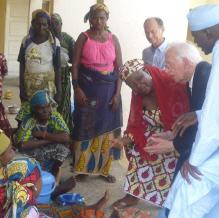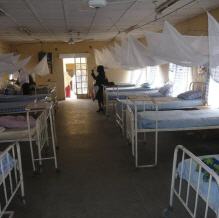Comprehensive Approach
Every day, about 800 women die from pregnancy- or childbirth-related complications around the world. 99 percent of all maternal deaths occur in developing countries - most of them could be prevented. What is missing is a comprehensive coordinated approach to tackle maternal mortality and an exchange of “best practices”. The approach must be comprehensive because of the multiple aspects of this widespread problem:
- Social/medical: early marriages and pregnancies of girls often not older than 11 or 12 years, insufficient medical care especially during labor
- cultural: high rate of home deliveries; lacking access to education for girls
- economic: insufficient medical infrastructure particularly in rural areas; poor equipment and training standards of personnel in health clinics.
Our Rotary pilot project “Improvement of Maternal Health” (2005-2010) in northern Nigeria, funded by The Rotary Foundation and co-funded by the German government (BMZ) and the Aventis Foundation, with a project amount of one million Euros was such a comprehensive approach, which is now scaled up in two additional states of Nigeria (FCT Abuja and Ondo). It includes six areas of activity:
- Awareness and advocacy to inform the public on how to avoid VVF and establish responsible parenthood
- Education and training of health personnel in fistula surgery and post-operative care and increase of the number of skilled birth attendants
- Equipment for hospitals and health care centers to provide adequate obstetric care,VVF operations and caesarean sections
- Rehabilitation of patients after clinical recovery with vocational training and micro-credit support programs
- Collaboration with local and international NGOs and foundations
- Close cooperation and integration of state officials and administration in order to guarantee the sustainability of the project, i.e. by introducing a regulatory action of quality assurance in obstetrics
In our 5-year-pilot project we focussed on two northern states of Nigeria (Kaduna and Kano) with a target group of 5.000.000 women. Our goal was to identify main risk factors for pregnant women and address them through advocacy and by raising awareness at the grass roots level. The elements of our comprehensive approach include radio serials, training of health personnel, delivery of medical equipment and improvement of quality of structure and process and provide routine HIV/AIDS testing to prevent mother-to-child transmission. Two hospitals have been equipped to serve as Fistula Treatment Centers where patients receive necessary reconstructive surgery and post-operative care. Additional Rotary satellite projects, such as education and microcredits for successfully treated fistula patients to enable them to have their own income and safe water management for clinics, are increasing the project´s lasting effects.
The improvement of the quality of structure and of process in hospitals is a prerequisite to better the health of women and children. Our activities are aimed to establish an Institute of Quality Assurance in Obstetrics to improve the outcome. The steps are: analyse the structure of the hospitals, raise the quality of obstetrical service, e.g. to make the operating theatre and delivery rooms functional, train doctors and midwifes to improve the quality of process and outcome, e.g. maternal and child health. Ten selected hospitals in Kaduna and Kano State started to participate in a continuous monthly data collection of maternal and child mortality, maternal disorders during pregnancy and delivery. In quarterly quality circles the doctors and midwifes from the hospitals discuss under supervision of a head midwife and representatives from the department of OB/GYN in Kano and Kaduna University hospitals the “blinded” results of each hospital. Maternal death forms will in addition deliver a profound insight in the causes of maternal death. The analysis of the data provides a continuous awareness of the tragedy and will stimulate discussions among doctors and midwifes and generate ways to prevent MM and FM. Once the quality of services of hospitals and staff is ensured, the next step would be raising awareness among the population on available quality maternal health services. With the help of cultural sensible media campaigns, women will get to know about the offer and advantage of the established services. As a consequence, they will seek reproductive health services before and for delivery.


